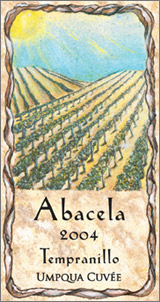

Abacela Vineyards and Winery
2004 Tempranillo "Umpqua Cuvée"(Southern Oregon)
When Earl and Hilda Jones settled in the town of Roseburg in Oregon’s Umpqua Valley AVA in 1994, it was after they’d searched the country to find the best place to grow the wine of their dream: Tempranillo. The great varietal core of Rioja and Ribera Del Duero was the Jones’ favorite wine, and they had the novel (then) idea of planting the grape in America. But where? After searching for the closest climatic match to Tempranillo’s Spanish home, they found their ideal match in Southern Oregon.
Their first Tempranillo release, and the first anywhere in the Pacific Northwest, was in 1997. Since then their Abacela winery (a derivation of the verb abacelar, meaning “to plant a grape vine”) has become a beacon of quality and innovation in the Southern Oregon AVA—an appellation that Earl Jones helped create.
For this 2004 Tempranillo, Umpqua Cuvée (Abacela’s more “entry-level” Tempranillo), winemaker Kiley Evans used fruit from the Abacela estate and nearby McCorquodale Vineyard. Made in a forward and immediately approachable style, the wine is full of plump dark fruit flavors—plum and blackberry—accented by notes of finely ground black pepper and dusty earth. Plenty of fine-grained tannins and a fresh acidity give an appealing vigor to the wine, and the finish shows spice, fruit, and admirable length. (816 cases were produced.)
Reviewed April 26, 2007 by Cole Danehower.
Other reviewed wines from Abacela Vineyards and Winery
|
Abacela Vineyards and Winery 2004 Tempranillo "Estate", Estate Grown (Southern Oregon)Cole Danehower 4/26/2007 |
The Wine
Winery: Abacela Vineyards and Winery |
The Reviewer Cole Danehower
Cole Danehower
Cole Danehower is the creator of the Oregon Wine Report. A frequent judge and a member of Northwest Palate magazine’s review panel, Cole's palate is particularly attuned to Northwest wines. He believes numerical scoring is inadequate in conveying the character of a wine, preferring to communicate his experience and evaluation of a wine through words. A believer in terroir (especially in Oregon's cooler growing regions) he also pays attention to the impact of winemaking style and vintage variation on a wine. He views balance, flavor purity, and a sense of character as key vinous virtues. |













